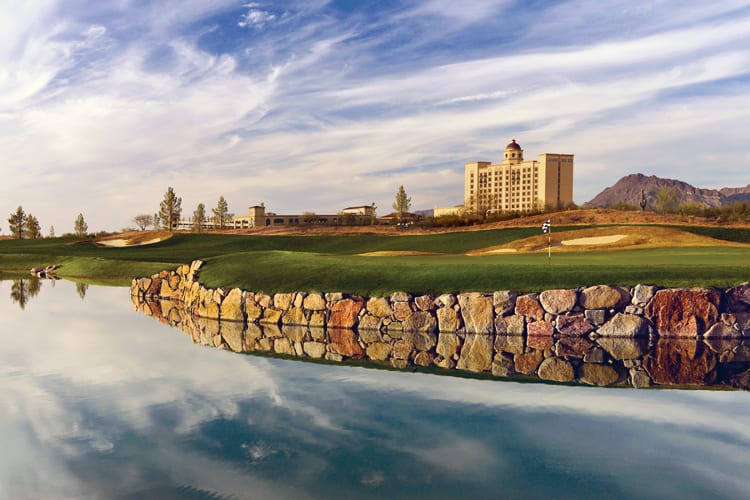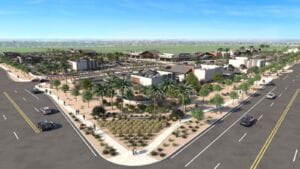In Tucson, the people of the Pascua Yaqui Tribe are celebrating a historic victory. On Dec. 27, President Joe Biden signed the Old Pascua Community Land Acquisition Act into law, which allows tribally owned lands to be taken into a trust on behalf of the Pascua Yaqui Tribe. It recognizes the 2021 Pascua Yaqui Tribe-State of Arizona Amended and Restated Gaming Compact, meaning gaming can occur in the Old Pascua Community — the oldest formally established area for the Yaqui people.
DEEPER DIVE: West Valley developers capitalize on tourism boom
The law, which passed with bipartisan support, incorporates a 30-acre parcel of land into the Pascua Yaqui Tribe’s reservation boundaries, Rep. Raúl Grijalva explains during a legislative hearing prior to the law’s enactment.
“In 1920, 40 acres of land were donated by A.M. Franklin for the establishment of a ‘Yaqui Nation’ in Arizona. Several families moved to this new Pascua Village, now known as ‘Old Pascua,’” he continues. “Since 1921, this location has been a sacred ceremonial site for the tribe.”
In a letter of support for the Old Pascua Community Land Acquisition Act, Tucson Mayor Regina Romero writes, “I recognize that what is present-day Tucson has historically been home to the Pascua Yaqui Tribe. I appreciate and respect that the Tribe continues to this very day to perform its traditional cultural ceremonies and provide support for its members in places like Old Pascua, where the Tribe’s historic community predates Arizona statehood.”
When the tribe gained federal recognition in 1978, it was given land in Southern Arizona, but Old Pascua was not included. Peter Yucupicio, chairman of the Pascua Yaqui Tribe, was born in Old Pascua and still lives there today. He notes that bringing the community into tribal hands has been a longtime dream.
“For hundreds, possibly thousands of years the Yaqui have been part of the landscape of Southern Arizona. Along the Santa Cruz River you will find remnants of the tribal folks that lived there,” he explains. “We’ve been here way before, but people think [we came] in the 1920s.”
Yucupicio adds that as early as the 1690s, the Tumacácori area became the earliest recorded settlement of Yaquis in what later became Arizona. Tribal members, he says, have resided in Old Pascua for countless generations before many were relocated to New Pascua in 1964.
As far as the cultural significance of Old Pascua, Yucupicio describes it as a place for tribal members to come together and perform ceremonies that have been passed down for hundreds of years. The word “Pascua” means Easter in Spanish, and the Tribe conducts sacred rituals — both Christian and pre-Christian in origin — during Lent and have done so for centuries.
“This is about preserving our ways and customs,” he continues. “There’s no guarantee that a business is going to be a success. But the preservation of who we are as Yaqui — our religion, traditions and way of life — no amount of money can replace that.”
New casino
While the primary concern of Yucupicio is safeguarding Yaqui cultural heritage, the new law also enables the Pascua Yaqui Tribe to build and operate its third casino. The other two locations, Casino Del Sol and Casino of the Sun, are situated on the Tribe’s reservation lands in the southwest part of the Tucson metro area.
In a 2021 letter to the U.S. Department of the Interior regarding amendments to the Arizona Tribal-State Gaming Compact signed by 10 members of Arizona’s congressional delegation — including Senators Kyrsten Sinema and Mark Kelly — the signatories underscore the economic impact of tribal gaming.
“In recent years, operations have generated around $4.75 billion in total sales and approximately $691 million in revenue share payments to state and local governments and taxes paid by employees and customers,” the letter reads. “Gaming facilities provide tribes with essential funding sources for tribal education, healthcare, housing, water infrastructure and other essential services.”
Old Pascua is approximately three miles north of Downtown Tucson — prime real estate for a gaming enterprise. That said, Kim Van Amburg, CEO of Casino Del Sol, notes that constructing the new casino will be challenging, but will create 500 new jobs and beautify the area.
“We’ve reached out to the City of Tucson and had contractors out there. It’s a complicated site,” she says. “There are existing structures, underground utilities, a railroad and a power substation. We’re not there yet in terms of ‘this is exactly what is going to be in it and what it looks like,’ but we’ve done our due diligence to get the ball rolling. Our hope is that in a couple of years we can break ground on something that will be a win-win for the Tribe and the community.”
In written testimony to Congress, Yucupicio notes that the project will generate approximately $17 million in direct wages and more than $12 million in annual vendor spending. Moreover, the property will pay $8.3 million in taxes each year, including gaming distributions to the state, payroll taxes and sales taxes.
“We looked at this property for its highest and best use, not only for us, but for the whole Tucson economy,” he concludes. “It’s an honor to work with all the jurisdictions to see how well we can take care of that area and make it a great place for people to get a chance to win right here [in Tucson] instead of going to Vegas.”




